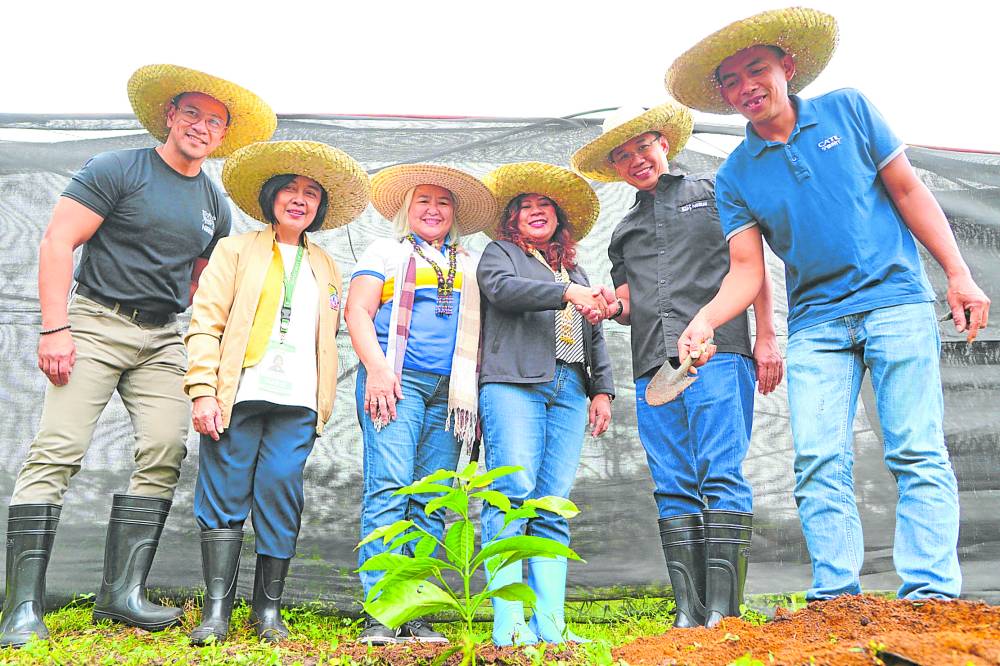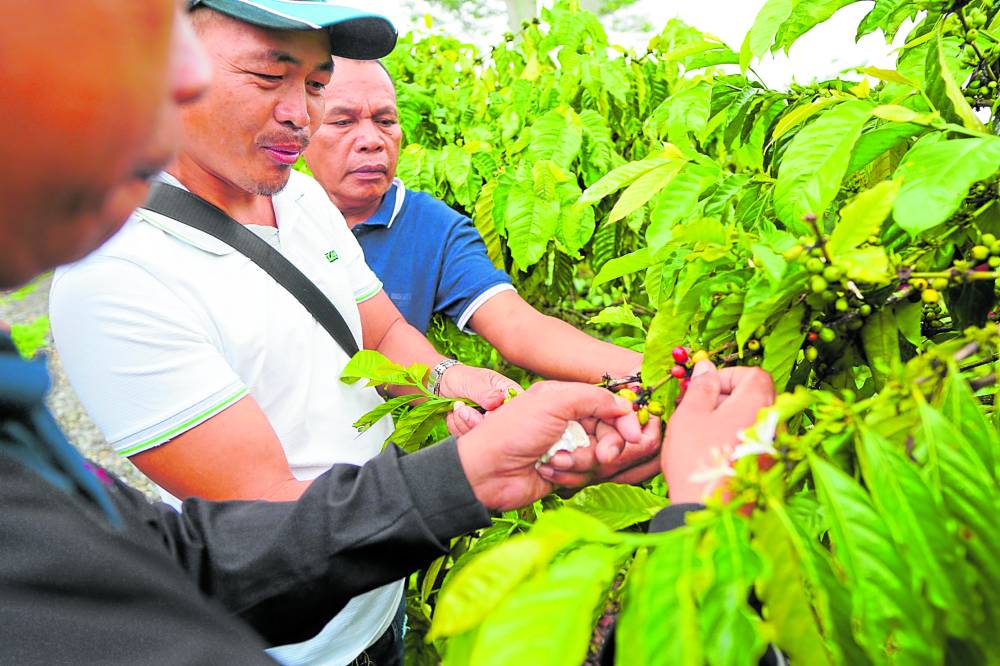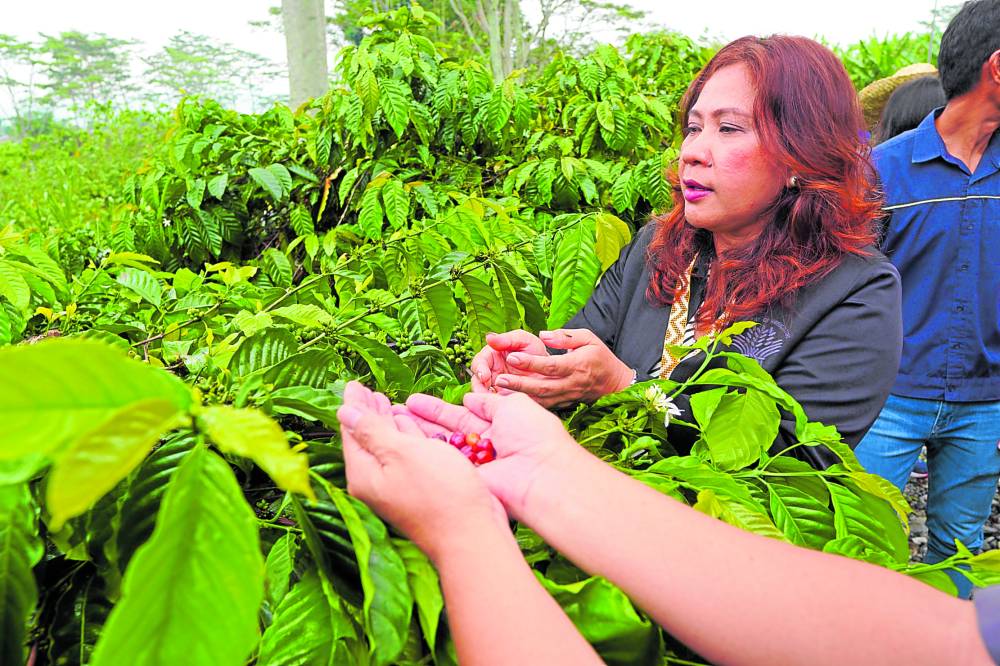
SEASON STARTER Officers of Nestlé Philippines and the Division of Agriculture be a part of Arnold Abear, a farmer-beneficiary of the “Nescafé Plan” initiative, in a symbolic planting of a Robusta tree to mark the beginning of the espresso season in addition to the celebration of the Nationwide Farmers and Fisherfolk Month on the Bukidnon Built-in Espresso Heart. —PHOTOS FROM NESTLÉ
Behind each steaming cup of espresso within the morning, which many Filipinos merely can’t do with out, are hardworking farmers who sadly don’t all the time get the appreciation and assist they richly deserve.
Nestlé Philippines and the Division of Agriculture (DA), nonetheless, are keenly conscious of their outsized contribution to the financial system and to folks’s very survival.
The 2 establishments, thus, celebrated Nationwide Farmers and Fisherfolk Month in Could by recognizing 24 excellent espresso farmer teams from Northern Mindanao and Soccsksargen—two of the highest coffee-producing areas within the nation.
These award-winning teams are among the many first to obtain fertilizer assist from the Mindanao Robusta Espresso Challenge (MRCP), a joint mission of the DA and Nestlé Philippines.
Aimed to enhance the manufacturing and sustainability of Robusta espresso farming in Mindanao, the MRCP is a five-year settlement between the DA and Nestlé to energise each step of the espresso worth chain by means of 5 fundamental areas. These are analysis; fertilizer help; upskilling of farmers; institution of espresso facilities; and logistics and advertising and marketing.
The fertilizer help was additionally an offshoot of the analysis trial performed by College of Southern Mindanao and Nestlé Philippines that can present the most effective mannequin of fertilization utilizing a mixture of natural and inorganic fertilizer to spice up espresso yield.
This contributes to MRCP’s fundamental goal, which is to develop acceptable and cost-effective, local weather resilient manufacturing applied sciences for Robusta espresso, the primary ingredient in instantaneous espresso.
In keeping with the Philippine Statistics Authority, Robusta is the most-produced sort of espresso, accounting for greater than 70 % of the nation’s complete espresso manufacturing. Sadly, that is nonetheless not sufficient to satisfy the nation’s rising wants.
At current, the Philippines can solely produce 38 % of what it wants, which implies it has to rely closely on imported espresso—primarily from neighboring Indonesia, Malaysia and Vietnam—to satisfy native demand.
Whereas it’s lamentable that the Philippines has to import a lot espresso, it additionally presents a chance for native espresso farmers to earn extra by assembly the demand and thus assist reduce the nation’s publicity to fluctuations in international costs and international trade volatility.

PRIZED PICKINGS Farmers examine robusta beans.
Smallholders
Nestlé is doing its share in boosting native manufacturing by means of its Nescafe Plan, which seeks to assist espresso farmers grow to be “agripreneurs,” enhance their yields and earnings by means of higher espresso varieties, planting methods and high quality inputs.
Smallholder farmers are the first beneficiaries as these farmers, who until about one to 2 hectares every, produce as a lot as 80 % of the Philippine’s total espresso output.
Consumption will increase yearly however manufacturing has not been in a position to sustain with the demand because of key challenges.
These embrace growing old timber, restricted farmer’s entry to high quality planting supplies and funding in addition to local weather change that has wreaked havoc on the planting cycle and planting situations.
Nestlé Philippines chair and CEO Kais Marzouki, nonetheless, has assured these farmers of the corporate’s unwavering assist, provided that it’s also within the multinational firm’s greatest curiosity to supply as a lot espresso from native producers as attainable, to be processed at its espresso processing plant in Cagayan de Oro.
“Because the nation’s largest espresso producer, we prioritize home sourcing from smallholder espresso farmers moderately than imports, to contribute within the long-term to the expansion of agriculture and the financial system. We envision a future when the Philippines shall be self-sufficient, even perhaps resume exporting espresso,” Marzouki stated in an announcement.
The Nescafe Plan, by means of its initiatives corresponding to Challenge Espresso+ in cooperation with GIZ (the German state company for worldwide cooperation), demonstrates the benefit of coaching farmers in entrepreneurship, good agricultural practices, and regenerative agriculture to safeguard their farming assets for continued and higher productiveness, and adapting to local weather change.

CASH CROP Cheryl Caballero, Agriculture Undersecretary for Excessive-Worth Crops, examines robusta timber.
Biz faculty
Since Challenge Espresso+ started in 2018, 1,500 farmers in Bukidnon and Sultan Kudarat have accomplished coaching in coffee-based diversified farming and agricultural entrepreneurship by means of the Farmer Enterprise Faculty.
To maintain efforts to upskill farmers on Regenerative Agriculture, Nestlé Philippines has launched into the second part of Challenge Espresso+ to coach one other 1,500 farmers, with added concentrate on regenerative agriculture within the manufacturing of Robusta.
Aside from the rise in yield, farmer individuals additionally succeeded in doubling their internet farm incomes, stated Nestle. Consequently, greater than 80 % of Challenge Espresso+ beneficiaries have already crossed the poverty threshold.
The DA, in the meantime, is allotting assets and energy to drive the manufacturing of high-value crops together with espresso.
Beneath its Excessive-Worth Crops Growth Program, the DA is dedicated to supply end-to-end assist for farmers and producers by means of schooling and coaching applications, in addition to provision of kit and instruments that can assist them produce high-quality and high-yielding crops.
To mark one other 12 months of cooperation, DA and Nestle representatives planted a Robusta tree on the DA workplace in Bukidnon, signaling the start of the espresso planting season for 2024 to 2025.
This additionally got here with the decision for extra farmers to undertake regenerative agriculture to scale back the impression of local weather change whereas getting ready the farms for the subsequent era of espresso farmers.
These regenerative farming strategies that ought to make the farms extra productive whereas retaining Mom Nature glad embrace intercropping, composting, agroforestry and planting of canopy crops to enhance biodiversity and restore vitamins of the soil, contributing to improved espresso high quality and amount.
With Nestle and DA serving to extra farmers undertake these confirmed strategies to considerably enhance yield, the Philippines ought to see extra espresso proudly grown and harvested by Filipino farmers for Filipino customers.

